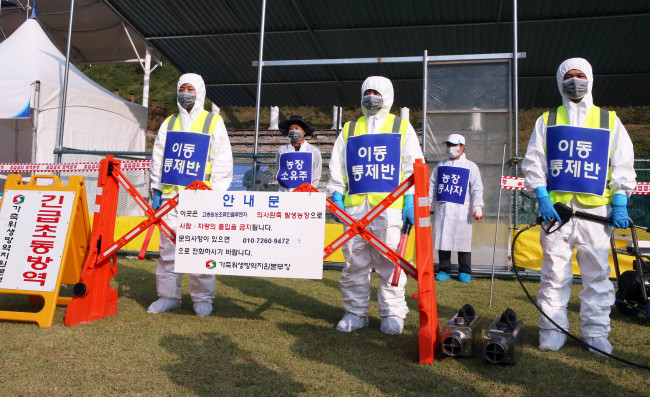Over W2tr wasted for failing to prevent animal epidemics: lawmaker
By Kim Da-solPublished : Oct. 11, 2017 - 17:03
Over 70 million livestock have been culled since 2011, as South Korea has battled foot-and-mouth disease, bird flu and other animal epidemics. This resulted in approximately 2.4 trillion won ($2.1 billion) of taxpayers’ money being spent on compensation to affected farms and the costs of culling, a lawmaker revealed Wednesday.

According to data from the Ministry of Agriculture, Food and Rural Affairs released by Rep. Kim Cheol-min of the ruling Democratic Party, 2.1 trillion won of the total expenses were compensations for livestock culled as part of the authorities’ efforts to contain the outbreaks of the foot-and-mouth disease, bird flu, brucellosis and bovine tuberculosis. Separately, an additional 92 billion won was billed by local governments since 2015 to support farmhouses which saw livestock damage.
Together with the disposal cost of culled livestock, personnel expenses and management cost of burying sites, at least 2.4 trillion won was spent over the past seven years on efforts to contain and prevent the spread of epidemics, the lawmaker said.
About 72 percent or some 1.5 trillion won of the total compensation amount was given to foot-and-mouth disease-hit farms, followed by 400 billion won to farms hit by bird flu and 92 billion won to farms hit by bovine tuberculosis.
Earlier this year, a report by the Organization for Economic Cooperation and Development said poor breeding conditions at poultry farms in South Korea are to blame for the fast spread of animal diseases such as a highly pathogenic strain of bird flu in recent decades.
By Kim Da-sol (ddd@heraldcorp.com)








![[Kim Seong-kon] Democracy and the future of South Korea](http://res.heraldm.com/phpwas/restmb_idxmake.php?idx=644&simg=/content/image/2024/04/16/20240416050802_0.jpg&u=)








![[KH Explains] Hyundai's full hybrid edge to pay off amid slow transition to pure EVs](http://res.heraldm.com/phpwas/restmb_idxmake.php?idx=652&simg=/content/image/2024/04/18/20240418050645_0.jpg&u=20240418181020)

![[Today’s K-pop] Zico drops snippet of collaboration with Jennie](http://res.heraldm.com/phpwas/restmb_idxmake.php?idx=642&simg=/content/image/2024/04/18/20240418050702_0.jpg&u=)